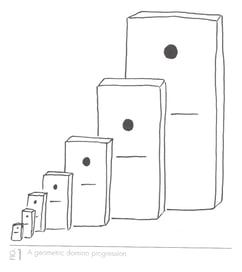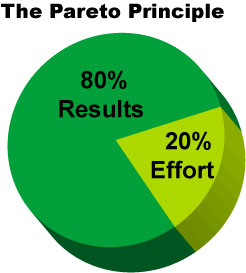 In The ONE Thing: The Surprisingly Simple Truth Behind Extraordinary Results we shared a remarkable video on the chain reaction that results when one domino falls on to another.
In The ONE Thing: The Surprisingly Simple Truth Behind Extraordinary Results we shared a remarkable video on the chain reaction that results when one domino falls on to another.
Verne Harnish has long touted the value of identifying One Thing for your business as your annual and quarterly priority. At Positioning Systems it’s a mandate we require our customers to identify in their planning for 2016.
One Thing author Gary Keller believes in going small. His experience repeatedly showed that by narrowing his concentration in his business and life, his success multiplied.
If achieving success is as simple as going small, focusing on One Thing, why don’t we follow it?
Keller shared six lies about success that keep us from living the One Thing:
- Everything Matters Equally
- Multi tasking
- A Disciplined Life
- Willpower Is Always on Will-Call
- A Balanced Life
- Big Is Bad
These six lies are beliefs that get into our heads. They’re operational principles driving us in the wrong direction, highways that end as bunny trails. These lies are fool’s gold that divert us from the mother lode.
In my early blog I promised to look at these to help you focus on One Thing. That’s where my focus is as my customers complete their Annual and First Quarter/trimester planning.
In this age of political correctness, I love how Keller opens his chapter on Everything Matters Equally: Equality is a worthy ideal pursued in the name of justice and human rights. In the real world of results, however, things are never equal. No matter how teachers grade—two students are not equal. No matter how fair officials try to be—contests are not equal. No matter how talented people are—no two are ever equal. A dime equals ten cents and people must absolutely be treated fairly, but in the world of achievement everything doesn’t matter equally.
Equality is a lie.
Understanding this is the basis of all great decisions.
I’m a quote lover, and these two quotes emphasize the importance of this issue of “everything mattering equally.”
“The things which are most important don’t always scream the loudest.” —Bob Hawke
“It’s not enough to be busy, so are the ants. The question is, what are we busy about?” -Henry David Thoreau
Remember this: Success is not won by whoever does the most.
To Do List
Do you make a To Do List? Keller feels to list is to tyrannize us with the trivial.
Do you have a love-hate relationship with your To Do List? Your email inbox can often dictate your day in the same manner as a to do list can. You simply can’t tackle tasks in the order you receive them.
Achievers operate differently. Achievers have an eye for the essential. They pause, think and plan their day, just long enough to decide what matters and then they pursue those things that matter to drive their day. The difference between an achiever and most others it they do sooner what others plan to do later.
Achievers always work from a clear sense of priority. If you simply create a To Do List it will lead you astray. To Do Lists are often nothing more than a survival list. They get you through the day but seldom, if ever, create a stepping-stone for the next sequence required to build a successful life.
In our Strategic Discipline Blog we’ve addressed this multiple times. Learn more about the importance of precision and specificity in your daily planning in: Priorities Discipline Requires Precision and Specificity, Focus on Priorities – Eisenhower Matrix, Key Behaviors Build Effective Energy Management Rituals, or, by browsing the entire selection of topics from Strategic Discipline blogs (10) on Precision and Specificity.
Success List – Pareto Principle
Just as in the domino example, we need to realize life doesn’t line up the right things for us in order for you and I to topple them sequentially to achieve our goals and neither does a To Do List.
How do you decide what matters most at any given moment of any day? What are the vital few that make a difference?
Vilfredo Pareto, an Italian economist, discovered in the 19th century a mathematical model for income distribution in Italy.  His discovery: 80 percent of the land was owned by 20 percent of the people. Many years later when America was struggling to decipher the Enigma Code (Germany’s infamous tool for encoding secret messages in WWI), Joseph Juran, an early quality-control pioneer, coined this idea for “vital few and trivial many” the Pareto Principle of unequal distribution.
His discovery: 80 percent of the land was owned by 20 percent of the people. Many years later when America was struggling to decipher the Enigma Code (Germany’s infamous tool for encoding secret messages in WWI), Joseph Juran, an early quality-control pioneer, coined this idea for “vital few and trivial many” the Pareto Principle of unequal distribution.
The Pareto Principle is very clear in the direction it points us to: the majority of what you want comes from the minority of what you do.
Extra ordinary results are created disproportionately by fewer actions than most of us realize.
Here’s the interesting fact that you may not realize about the Pareto’s Principle. The 80/20 principle is not essentially a fact. It could be 90/20 or 70/10 or even 65/5. Depending on circumstances your results may vary, yet the fundamental truth is always present. Not everything matters equally. Some things (the essential things for each of us) matter more, much more than others.
In order to make your To Do List a success list you need to apply the Pareto Principle to it. Which items on your list produce the greatest results?
The key to getting more done in 2016: GO SMALL!
Here’s the question for our next blog: If doing the most important thing is the most important thing, why would you try to do anything else at the same time? The lie of multi tasking is the next blog






.jpeg?width=150&height=135&name=Hand%20with%20marker%20writing%20the%20question%20Whats%20Next_%20(1).jpeg)

